Reflective Writing: Assessment in Mental Health Nursing
VerifiedAdded on 2022/10/04
|5
|998
|40
Journal and Reflective Writing
AI Summary
This reflective writing assignment details a student's experience in psychiatric nursing, focusing on the assessment of a 34-year-old woman with schizophrenia, PTSD, substance abuse, and anxiety. The assignment follows Gibb's reflective model, exploring the nurse's feelings, evaluation of contextual factors, analysis of institutional and emotional responses, and conclusions about therapeutic approaches. It covers the patient's background, presenting complaints, and the nurse's responsibilities in providing care, including addressing potential mistrust and emotional responses. The reflective writing emphasizes the importance of two-way communication and medication in the treatment of schizophrenia and highlights the student's plan for future practice, including kindness, empathy, and the use of physical exercise and meditation in patient care. The assignment includes references to relevant literature and research on schizophrenia and related conditions.
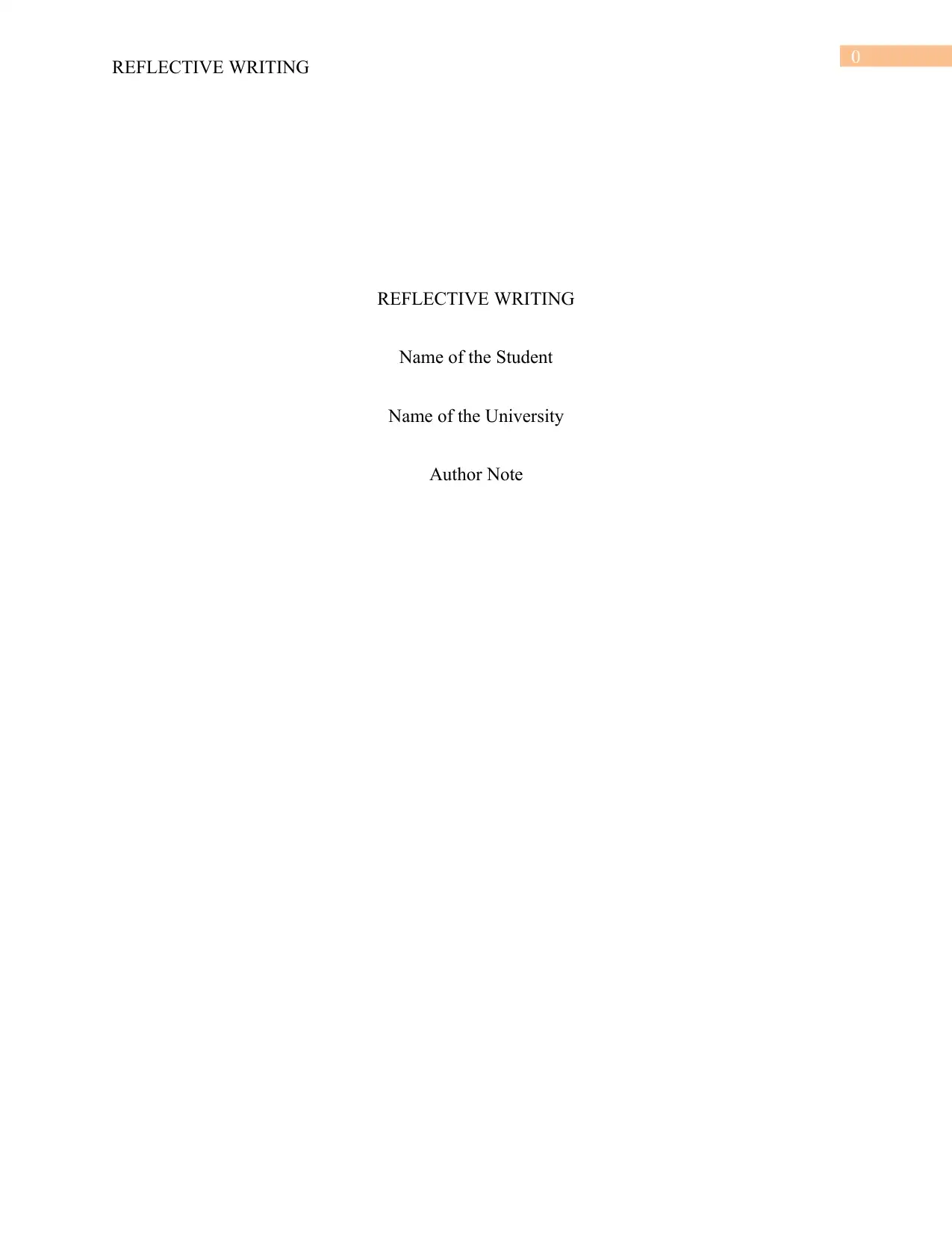
0
REFLECTIVE WRITING
REFLECTIVE WRITING
Name of the Student
Name of the University
Author Note
REFLECTIVE WRITING
REFLECTIVE WRITING
Name of the Student
Name of the University
Author Note
Paraphrase This Document
Need a fresh take? Get an instant paraphrase of this document with our AI Paraphraser
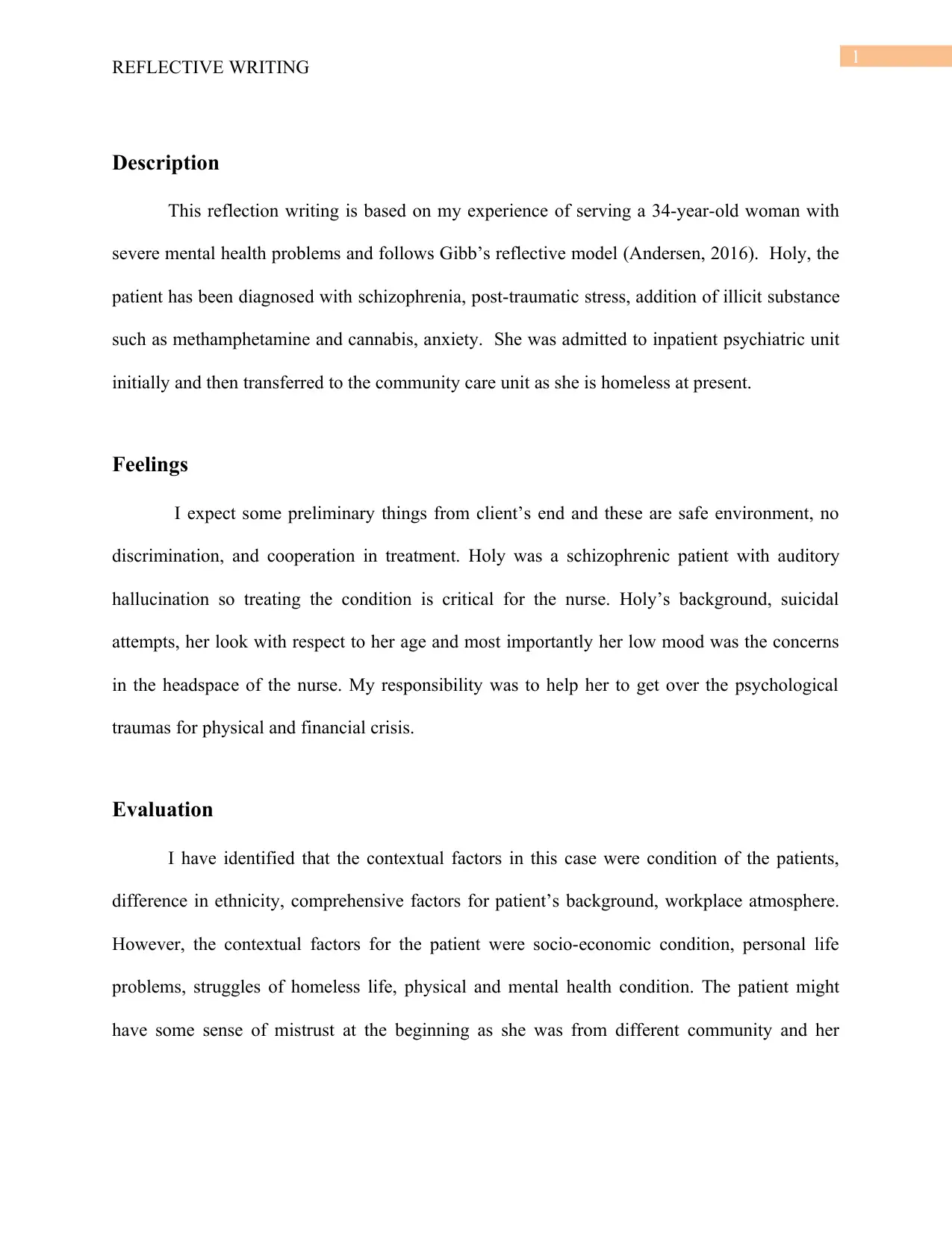
1
REFLECTIVE WRITING
Description
This reflection writing is based on my experience of serving a 34-year-old woman with
severe mental health problems and follows Gibb’s reflective model (Andersen, 2016). Holy, the
patient has been diagnosed with schizophrenia, post-traumatic stress, addition of illicit substance
such as methamphetamine and cannabis, anxiety. She was admitted to inpatient psychiatric unit
initially and then transferred to the community care unit as she is homeless at present.
Feelings
I expect some preliminary things from client’s end and these are safe environment, no
discrimination, and cooperation in treatment. Holy was a schizophrenic patient with auditory
hallucination so treating the condition is critical for the nurse. Holy’s background, suicidal
attempts, her look with respect to her age and most importantly her low mood was the concerns
in the headspace of the nurse. My responsibility was to help her to get over the psychological
traumas for physical and financial crisis.
Evaluation
I have identified that the contextual factors in this case were condition of the patients,
difference in ethnicity, comprehensive factors for patient’s background, workplace atmosphere.
However, the contextual factors for the patient were socio-economic condition, personal life
problems, struggles of homeless life, physical and mental health condition. The patient might
have some sense of mistrust at the beginning as she was from different community and her
REFLECTIVE WRITING
Description
This reflection writing is based on my experience of serving a 34-year-old woman with
severe mental health problems and follows Gibb’s reflective model (Andersen, 2016). Holy, the
patient has been diagnosed with schizophrenia, post-traumatic stress, addition of illicit substance
such as methamphetamine and cannabis, anxiety. She was admitted to inpatient psychiatric unit
initially and then transferred to the community care unit as she is homeless at present.
Feelings
I expect some preliminary things from client’s end and these are safe environment, no
discrimination, and cooperation in treatment. Holy was a schizophrenic patient with auditory
hallucination so treating the condition is critical for the nurse. Holy’s background, suicidal
attempts, her look with respect to her age and most importantly her low mood was the concerns
in the headspace of the nurse. My responsibility was to help her to get over the psychological
traumas for physical and financial crisis.
Evaluation
I have identified that the contextual factors in this case were condition of the patients,
difference in ethnicity, comprehensive factors for patient’s background, workplace atmosphere.
However, the contextual factors for the patient were socio-economic condition, personal life
problems, struggles of homeless life, physical and mental health condition. The patient might
have some sense of mistrust at the beginning as she was from different community and her
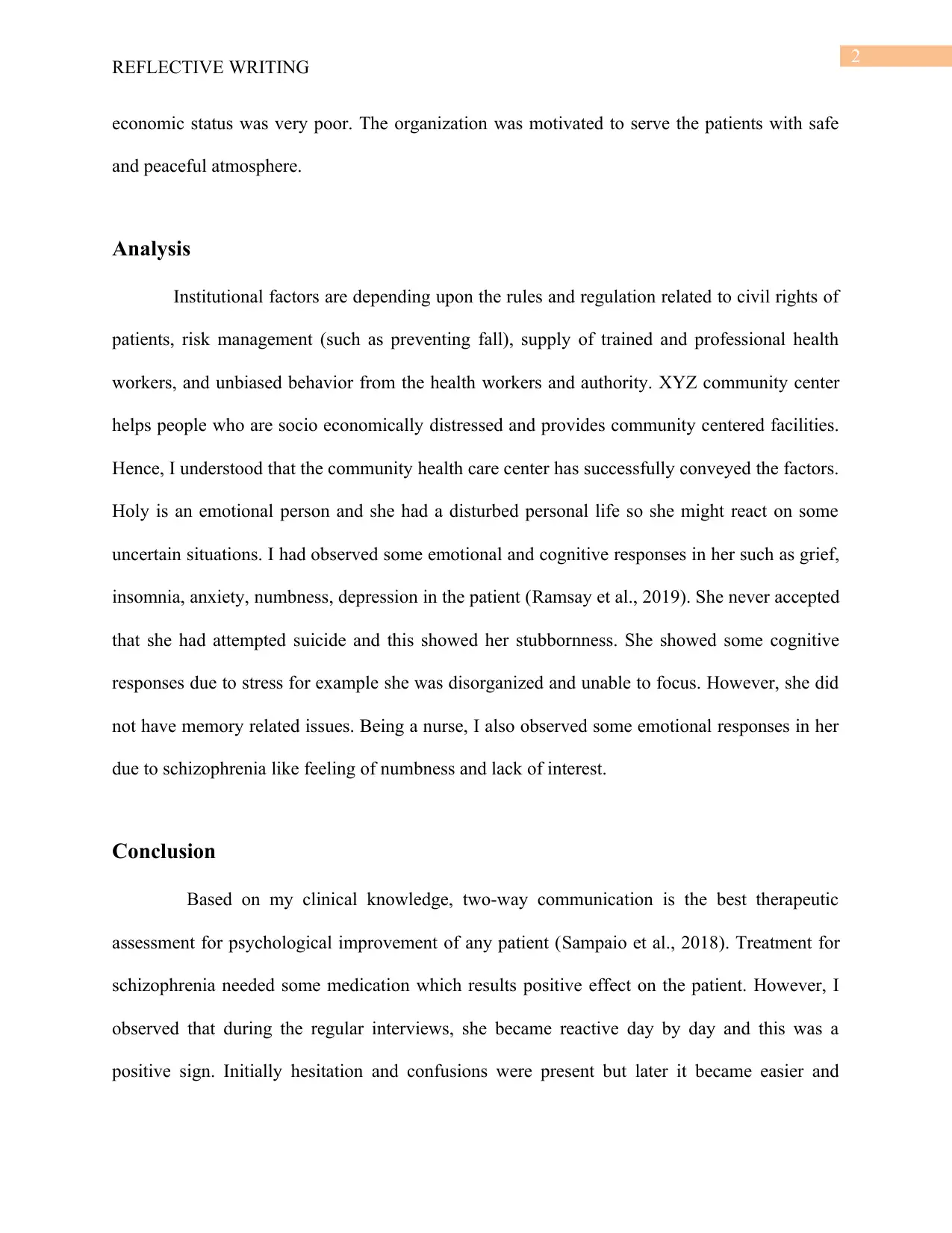
2
REFLECTIVE WRITING
economic status was very poor. The organization was motivated to serve the patients with safe
and peaceful atmosphere.
Analysis
Institutional factors are depending upon the rules and regulation related to civil rights of
patients, risk management (such as preventing fall), supply of trained and professional health
workers, and unbiased behavior from the health workers and authority. XYZ community center
helps people who are socio economically distressed and provides community centered facilities.
Hence, I understood that the community health care center has successfully conveyed the factors.
Holy is an emotional person and she had a disturbed personal life so she might react on some
uncertain situations. I had observed some emotional and cognitive responses in her such as grief,
insomnia, anxiety, numbness, depression in the patient (Ramsay et al., 2019). She never accepted
that she had attempted suicide and this showed her stubbornness. She showed some cognitive
responses due to stress for example she was disorganized and unable to focus. However, she did
not have memory related issues. Being a nurse, I also observed some emotional responses in her
due to schizophrenia like feeling of numbness and lack of interest.
Conclusion
Based on my clinical knowledge, two-way communication is the best therapeutic
assessment for psychological improvement of any patient (Sampaio et al., 2018). Treatment for
schizophrenia needed some medication which results positive effect on the patient. However, I
observed that during the regular interviews, she became reactive day by day and this was a
positive sign. Initially hesitation and confusions were present but later it became easier and
REFLECTIVE WRITING
economic status was very poor. The organization was motivated to serve the patients with safe
and peaceful atmosphere.
Analysis
Institutional factors are depending upon the rules and regulation related to civil rights of
patients, risk management (such as preventing fall), supply of trained and professional health
workers, and unbiased behavior from the health workers and authority. XYZ community center
helps people who are socio economically distressed and provides community centered facilities.
Hence, I understood that the community health care center has successfully conveyed the factors.
Holy is an emotional person and she had a disturbed personal life so she might react on some
uncertain situations. I had observed some emotional and cognitive responses in her such as grief,
insomnia, anxiety, numbness, depression in the patient (Ramsay et al., 2019). She never accepted
that she had attempted suicide and this showed her stubbornness. She showed some cognitive
responses due to stress for example she was disorganized and unable to focus. However, she did
not have memory related issues. Being a nurse, I also observed some emotional responses in her
due to schizophrenia like feeling of numbness and lack of interest.
Conclusion
Based on my clinical knowledge, two-way communication is the best therapeutic
assessment for psychological improvement of any patient (Sampaio et al., 2018). Treatment for
schizophrenia needed some medication which results positive effect on the patient. However, I
observed that during the regular interviews, she became reactive day by day and this was a
positive sign. Initially hesitation and confusions were present but later it became easier and
⊘ This is a preview!⊘
Do you want full access?
Subscribe today to unlock all pages.

Trusted by 1+ million students worldwide
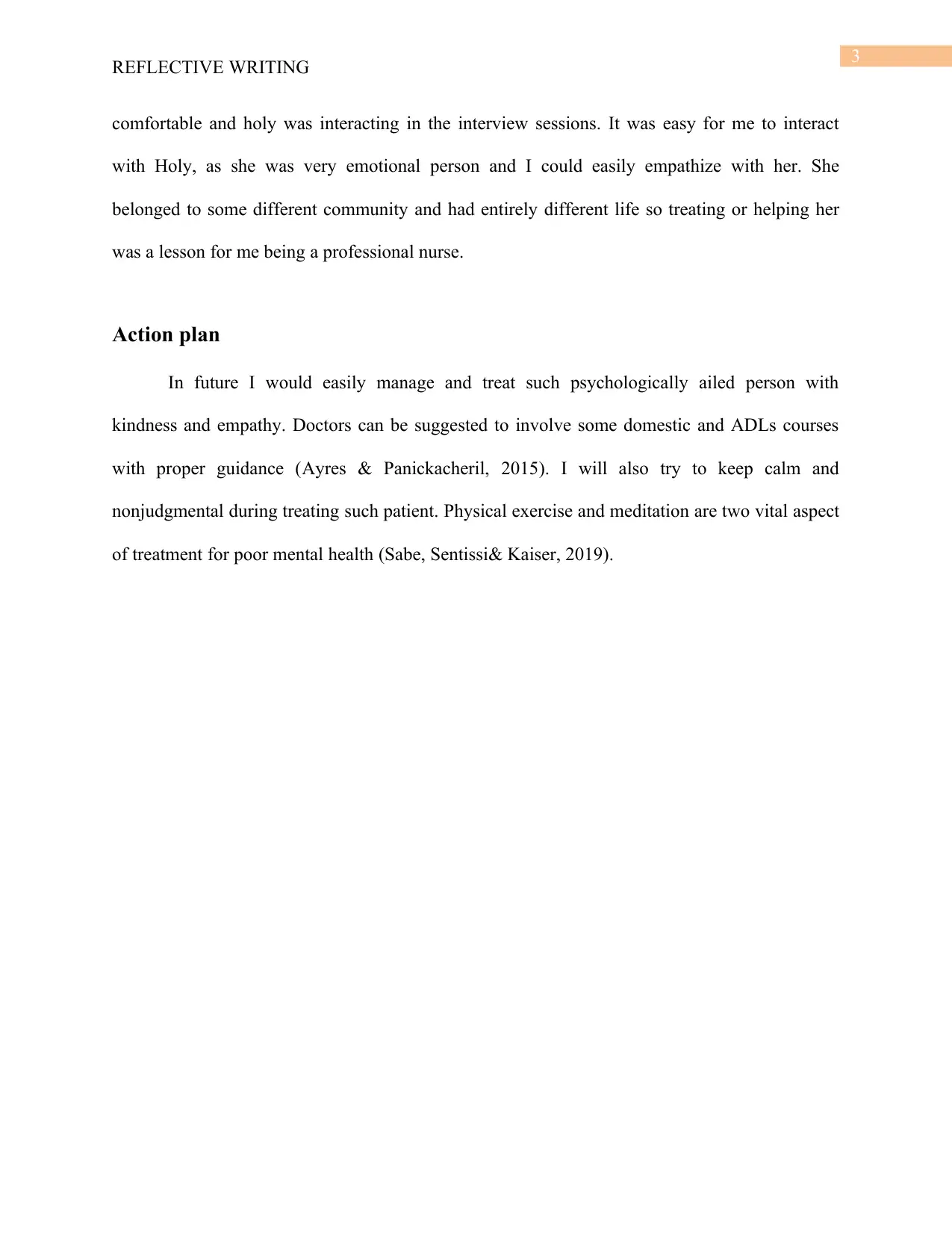
3
REFLECTIVE WRITING
comfortable and holy was interacting in the interview sessions. It was easy for me to interact
with Holy, as she was very emotional person and I could easily empathize with her. She
belonged to some different community and had entirely different life so treating or helping her
was a lesson for me being a professional nurse.
Action plan
In future I would easily manage and treat such psychologically ailed person with
kindness and empathy. Doctors can be suggested to involve some domestic and ADLs courses
with proper guidance (Ayres & Panickacheril, 2015). I will also try to keep calm and
nonjudgmental during treating such patient. Physical exercise and meditation are two vital aspect
of treatment for poor mental health (Sabe, Sentissi& Kaiser, 2019).
REFLECTIVE WRITING
comfortable and holy was interacting in the interview sessions. It was easy for me to interact
with Holy, as she was very emotional person and I could easily empathize with her. She
belonged to some different community and had entirely different life so treating or helping her
was a lesson for me being a professional nurse.
Action plan
In future I would easily manage and treat such psychologically ailed person with
kindness and empathy. Doctors can be suggested to involve some domestic and ADLs courses
with proper guidance (Ayres & Panickacheril, 2015). I will also try to keep calm and
nonjudgmental during treating such patient. Physical exercise and meditation are two vital aspect
of treatment for poor mental health (Sabe, Sentissi& Kaiser, 2019).
Paraphrase This Document
Need a fresh take? Get an instant paraphrase of this document with our AI Paraphraser
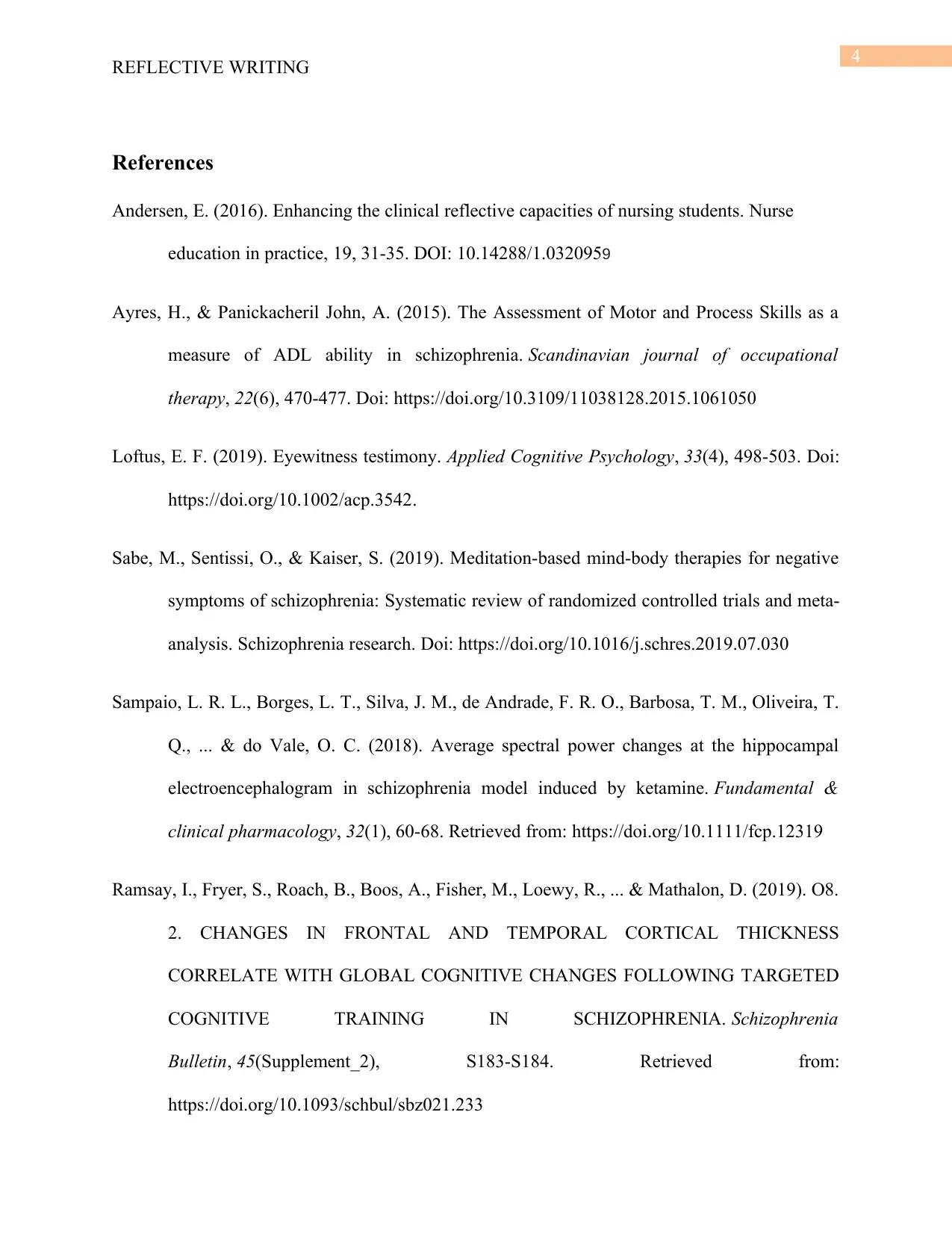
4
REFLECTIVE WRITING
References
Andersen, E. (2016). Enhancing the clinical reflective capacities of nursing students. Nurse
education in practice, 19, 31-35. DOI: 10.14288/1.0320959
Ayres, H., & Panickacheril John, A. (2015). The Assessment of Motor and Process Skills as a
measure of ADL ability in schizophrenia. Scandinavian journal of occupational
therapy, 22(6), 470-477. Doi: https://doi.org/10.3109/11038128.2015.1061050
Loftus, E. F. (2019). Eyewitness testimony. Applied Cognitive Psychology, 33(4), 498-503. Doi:
https://doi.org/10.1002/acp.3542.
Sabe, M., Sentissi, O., & Kaiser, S. (2019). Meditation-based mind-body therapies for negative
symptoms of schizophrenia: Systematic review of randomized controlled trials and meta-
analysis. Schizophrenia research. Doi: https://doi.org/10.1016/j.schres.2019.07.030
Sampaio, L. R. L., Borges, L. T., Silva, J. M., de Andrade, F. R. O., Barbosa, T. M., Oliveira, T.
Q., ... & do Vale, O. C. (2018). Average spectral power changes at the hippocampal
electroencephalogram in schizophrenia model induced by ketamine. Fundamental &
clinical pharmacology, 32(1), 60-68. Retrieved from: https://doi.org/10.1111/fcp.12319
Ramsay, I., Fryer, S., Roach, B., Boos, A., Fisher, M., Loewy, R., ... & Mathalon, D. (2019). O8.
2. CHANGES IN FRONTAL AND TEMPORAL CORTICAL THICKNESS
CORRELATE WITH GLOBAL COGNITIVE CHANGES FOLLOWING TARGETED
COGNITIVE TRAINING IN SCHIZOPHRENIA. Schizophrenia
Bulletin, 45(Supplement_2), S183-S184. Retrieved from:
https://doi.org/10.1093/schbul/sbz021.233
REFLECTIVE WRITING
References
Andersen, E. (2016). Enhancing the clinical reflective capacities of nursing students. Nurse
education in practice, 19, 31-35. DOI: 10.14288/1.0320959
Ayres, H., & Panickacheril John, A. (2015). The Assessment of Motor and Process Skills as a
measure of ADL ability in schizophrenia. Scandinavian journal of occupational
therapy, 22(6), 470-477. Doi: https://doi.org/10.3109/11038128.2015.1061050
Loftus, E. F. (2019). Eyewitness testimony. Applied Cognitive Psychology, 33(4), 498-503. Doi:
https://doi.org/10.1002/acp.3542.
Sabe, M., Sentissi, O., & Kaiser, S. (2019). Meditation-based mind-body therapies for negative
symptoms of schizophrenia: Systematic review of randomized controlled trials and meta-
analysis. Schizophrenia research. Doi: https://doi.org/10.1016/j.schres.2019.07.030
Sampaio, L. R. L., Borges, L. T., Silva, J. M., de Andrade, F. R. O., Barbosa, T. M., Oliveira, T.
Q., ... & do Vale, O. C. (2018). Average spectral power changes at the hippocampal
electroencephalogram in schizophrenia model induced by ketamine. Fundamental &
clinical pharmacology, 32(1), 60-68. Retrieved from: https://doi.org/10.1111/fcp.12319
Ramsay, I., Fryer, S., Roach, B., Boos, A., Fisher, M., Loewy, R., ... & Mathalon, D. (2019). O8.
2. CHANGES IN FRONTAL AND TEMPORAL CORTICAL THICKNESS
CORRELATE WITH GLOBAL COGNITIVE CHANGES FOLLOWING TARGETED
COGNITIVE TRAINING IN SCHIZOPHRENIA. Schizophrenia
Bulletin, 45(Supplement_2), S183-S184. Retrieved from:
https://doi.org/10.1093/schbul/sbz021.233
1 out of 5
Related Documents
Your All-in-One AI-Powered Toolkit for Academic Success.
+13062052269
info@desklib.com
Available 24*7 on WhatsApp / Email
![[object Object]](/_next/static/media/star-bottom.7253800d.svg)
Unlock your academic potential
Copyright © 2020–2026 A2Z Services. All Rights Reserved. Developed and managed by ZUCOL.



